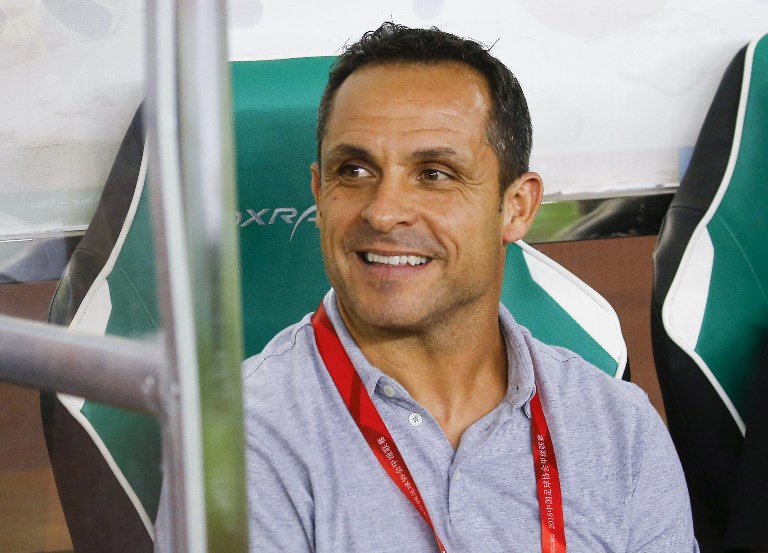
This photo taken on September 15, 2018 shows Zhejiang Greentown headcoach Sergi Barjuan looking on during the Chinese second division football match between Zhejiang Greentown and Beijing BG in Hangzhou in China’s eastern Zhejiang province.Barjuan excelled at Barcelona for nearly a decade, played in two World Cups for Spain and counts Pep Guardiola as a close friend. No wonder then that it took time getting used to China’s second division, where he says that players often lack composure and some pitches are desperately poor. / AFP PHOTO / STR / China OUT
Sergi Barjuan excelled at Barcelona for nearly a decade, played in two World Cups for Spain and counts Pep Guardiola as a close friend.
No wonder then that it took time getting used to China’s second division, where he says that players often lack composure and some pitches are desperately poor.
Known in the football world simply as Sergi, the 46-year-old left his family behind last November to become coach of Zhejiang Greentown, who were relegated in 2016.
Barcelona it is not.
But after a rough start getting settled, the no-nonsense former defender has taken a youthful side to within touching distance of a return to the Chinese Super League (CSL).
It is a measure of compensation for the “big problem” of being away from his family in Spain, especially his four children.
“Now it’s very good, but the first four months were very difficult — different culture, different food, different thinking about life,” he told AFP during an interview in Hangzhou, the city near Shanghai where Zhejiang are based.
It was more than just adjusting to a new life for Sergi, a mainstay for Barcelona as a raiding left-back from 1993 to 2002 — it was learning a new kind of football.
“This football is different from Europe. The last 20-25 minutes is crazy football, each match is the same, attack, attack, attack, no control,” he said, speaking English but occasionally turning to his translator, the man he jokingly calls his “Chinese wife” because he is so reliant on him.
Sergi’s point was illustrated on Saturday when Zhejiang, second in China League One, surrendered a 2-0 home lead during a madcap three-minute spell to draw with mid-table Beijing BG.
Several times Sergi buried his head in his hands as his team unraveled.
But they travel to Wuhan Zall on Wednesday in a top-of-the-table clash knowing that victory will put their promotion charge back on track with a handful of games left.
Sergi, who won nine major trophies with Barcelona and played with the likes of Guardiola and the Brazilian greats Ronaldo, Romario and Rivaldo, said his first task at Zhejiang was to make the players run less and think more.
“They cannot play like Barcelona, that’s impossible, impossible,” said the likeable Sergi, who earned more than 50 caps for Spain.
“But a lot of the running is meaningless. When they get the ball, they need to think: what’s best for the team?
“Yesterday, the last 20 minutes… just running but not thinking, stop!”
Guardiola friendship
Sergi, who after leaving Barcelona played for Atletico Madrid for three years, is one of the best-known among a clutch of foreign coaches working in China, lured to the country by handsome contracts.
He hopes that promotion to the CSL would mean farewell to the pitches of the second tier, calling their sometimes poor quality one of the biggest differences he has found from home, and describing Zhejiang’s own surface as “very, very bad”.
That could explain his side’s stuttering home form, failing to win in their last eight matches at their sparsely supported Dragon Sports Center stadium.
After retiring as a player in 2005, Sergi spent two years as Barcelona youth coach, then managed three different Spanish sides, the last being Mallorca briefly in 2017.
Then came the phone call from China, whisking him to the other side of the world.
What with the time difference and demands of the job, Sergi does not watch Barcelona on television, even for El Clasico.
But he remains friends with many of his Camp Nou team-mates, particularly Manchester City manager Guardiola.
Sergi gives an insight into what makes his fellow Catalan one of the greatest coaches of his generation.
“I talk to him about my experience here, always he wants to know about other kinds of football.
“He asks me what experiences I have or lessons I have learnt in China, then he uses that.
“He likes to get advice to improve himself and learn from it.”

